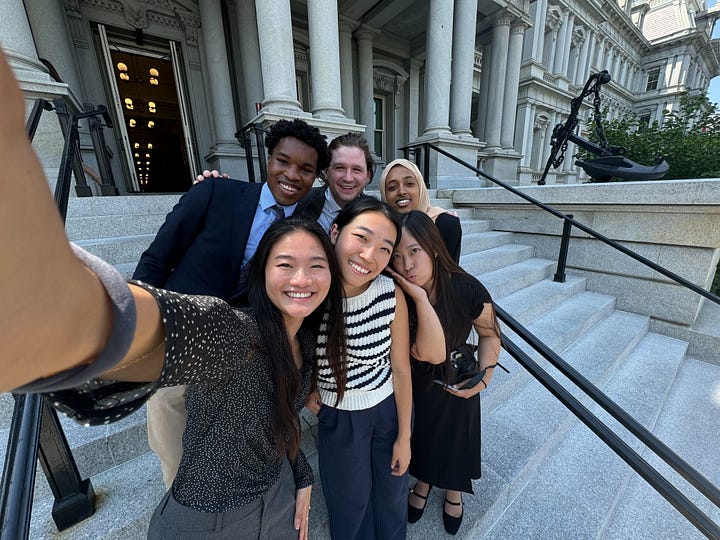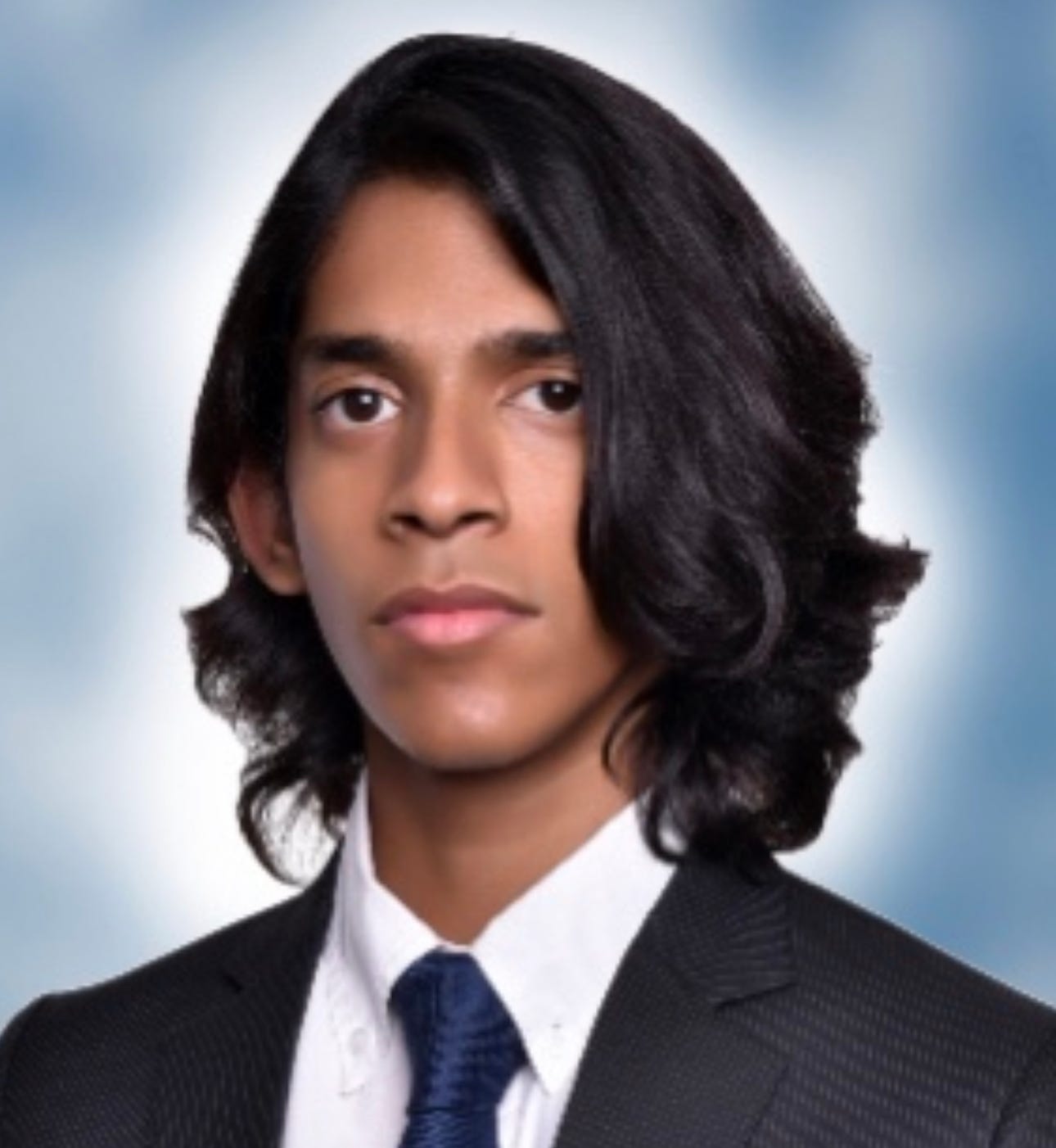Present Meets Future: Paragon Fellows Gain Insight into Working in the White House Office of Science and Technology Policy
Paragon fellows talk projects, careers, and research interests with the White House Office of Science and Technology Policy’s Technology Team

Contributed by Kaitlyn Cui
On Monday, August 5, spring and summer Paragon fellows received a special chance to attend a one-on-one session with members of the White House Office of Science and Technology Policy’s (OSTP) Technology Team. At this meeting, fellows introduced themselves, presented their projects, and learned about OSTP employees’ career journeys.


Like the fellows, the diversity in backgrounds of the White House OSTP became a highlight of this convening. Some staffers began their tech policy journeys at a global level, developing international technical standards for web accessibility, while others began their career journeys as U.S. Digital Corp Fellows or in private sector roles.
Among those present included U.S. Digital Corp Fellow Drew Keller, who explained his projects measuring administration spending and supporting decision-making around major Science and Technology (S&T) legislation like the Investing in America Agenda. Travis Hoppe, Assistant Director of AI Research and Development, emphasized his work on the National Artificial Intelligence Research Resource (NAIRR) Pilot to bring resources to underserved students, researchers, and small businesses studying technology and innovation. Shreeya Parekh, a Master’s candidate in Technology Policy at MIT and a summer intern at the OSTP, discussed how she delved into AI privacy and accessibility for the White House’s digital resources.

After self-introductions, Paragon’s summer fellows introduced their different projects spanning privacy, generative AI (GenAI) policymaking, and the Americans with Disabilities Act, and shared their biggest learning moments during the Paragon Fellowship. Paragon executive founder Rithwik Sudharsan expressed his shock at all the logistical barriers that privacy laws instigated when accessing important data for a current houselessness project that Paragon Fellows were working on with the California Health & Human Services Department. St. Louis fellow Rhea Banerjee learned that disparities in the translation capacity of GenAI tools for hundreds of lesser-spoken languages were critical areas of consideration for government adoption of accessible technologies.
The meeting concluded with fellows asking for career and life guidance from the OSTP team. Amongst the most memorable tidbits were the importance of keeping an open mind for the ever-evolving tech industry, and the diversity of paths when it came to breaking into public interest tech.. Above all, the team stressed the importance of getting to know and developing relationships with colleagues before becoming overly immersed in work.
Read on to hear directly from the fellows on what they learned from meeting with the White House OSTP.
Favour Nerrise, Project Lead, San José
Previously: San José (Public) Spring Project Lead
Biggest Takeaway: “Seeing my project team speak up and share their thoughts, knowing how they came in day one and the type of impact they wished to have, I don't even think they could have dreamt of this moment. Service and leadership mean the world to me, so this was an extremely fulfilling moment. It was also interesting to hear from the officials reaffirming that your path into tech policy or whatever type of policymaking doesn't have to look one certain way.
There's been a perception, as someone who grew up in Maryland in a politics-heavy environment, that in order to get into politics, you have to go to law school and complete all these other things that make you feel equipped to have a voice on the Hill. It was so inspiring to hear the officials say, ‘I'm interested in your brilliance, even if you are still an undergraduate student, and even if you're a young professional. Even if you don't know what you want to do next, that's just as important, and you don't need to already have an established voice in the room to influence tech policy.’
That was incredible to hear from the mouths of people directly in charge. I encouraged my fellows to fully participate beforehand, reminding them that ‘this is a special moment for you all that you deserve to remember forever.”
Rhea Banerjee, Fellow, St. Louis
Biggest takeaway: “The event was super memorable because the OSTP is a career area I want to explore further in the future. Hearing about different people's paths to where they are now was a relief to me. One of the things about the policy world is that anyone can say they want to work on policy, but there are just so many different policy areas that it can get confusing. So the different clarifications and explanations of how each team member got to where they are now was inspirational, as I haven't had much interaction with anyone in this specific sphere before. It was really a valuable learning opportunity.”
Elisha Ham, Fellow, Lebanon ADA
Previously: Boston Technology Procurement Spring Fellow
Biggest takeaway: “I loved presenting about our own projects and hearing about what everyone else was doing. The specific career advice that we got [during the event] was the best part for me. In college and maybe in industry as well, I don't necessarily connect with many people doing tech and policy at the same time, much less people who have been involved in tech and policy for more than just a few years. Getting to hear perspectives at the federal level, as someone who’s doing local work, and then hearing the difference between how the executive, legislative, and judicial branches interact with tech policy, was the most educational and productive experience I got out of the event.”
Anjan Balakrishnan, Fellow, Lebanon Privacy
Biggest takeaway: “My favorite moment from the event was learning how citizens and lobbyists can engage in "entrepreneurial politics." One OSTP team member was describing how he used to be a lobbyist, and how he was once able to almost single-handedly influence members of the Virginia state legislature to pass a certain piece of legislation. Virginia ended up passing the bill, which triggered a nationwide avalanche of similar bills on the state level.
My takeaway was that a small group of people, or even a single person, can catalyze meaningful change by starting small, changing a few minds through compelling arguments, and building momentum.”
Wendy Zeng, Fellow, Santa Clara
Biggest takeaway: “Meeting experts at OSTP showed me how impactful and interconnected the field of tech policy is. It's a field that embraces contributions from individuals of all backgrounds and areas of expertise. Whether it is diverse focus areas, policy levels (e.g. legislative, executive), or scope levels (e.g. local, state, federal), there are various ways to enter tech policy and have a high impact.
Tech policy is not just about regulating technology, but shaping the future of society in a way that reflects our values and goals. It touches on crucial areas including privacy, equity, and social justice, making it a field where diverse ideas, voices, and perspectives are not only welcomed but necessary. This event broadened my understanding of tech policy, and inspired me to further explore it, remaining open to the various ways to create impact.”
Paragon would like to extend our sincerest gratitude to Kristen Busch, Judy Brewer, Travis Hoppe, Jeremy Epstein, Bella Mendoza, Drew Keller, Shreeya Parekh, Katerina Kaganovich, and the rest of the OSTP team for meeting with our fellows and inspiring the next generation of tech policy leaders.
If you are interested in participating in similar events, working on policy projects with lasting impact, and gaining an invaluable community of tech policy peers and mentors, apply for the fall Paragon Fellowship cohort! Applications are open until September 5th at https://tinyurl.com/paragon-f24-apps.










Such a great experience :)
Lucky to have been a part of it